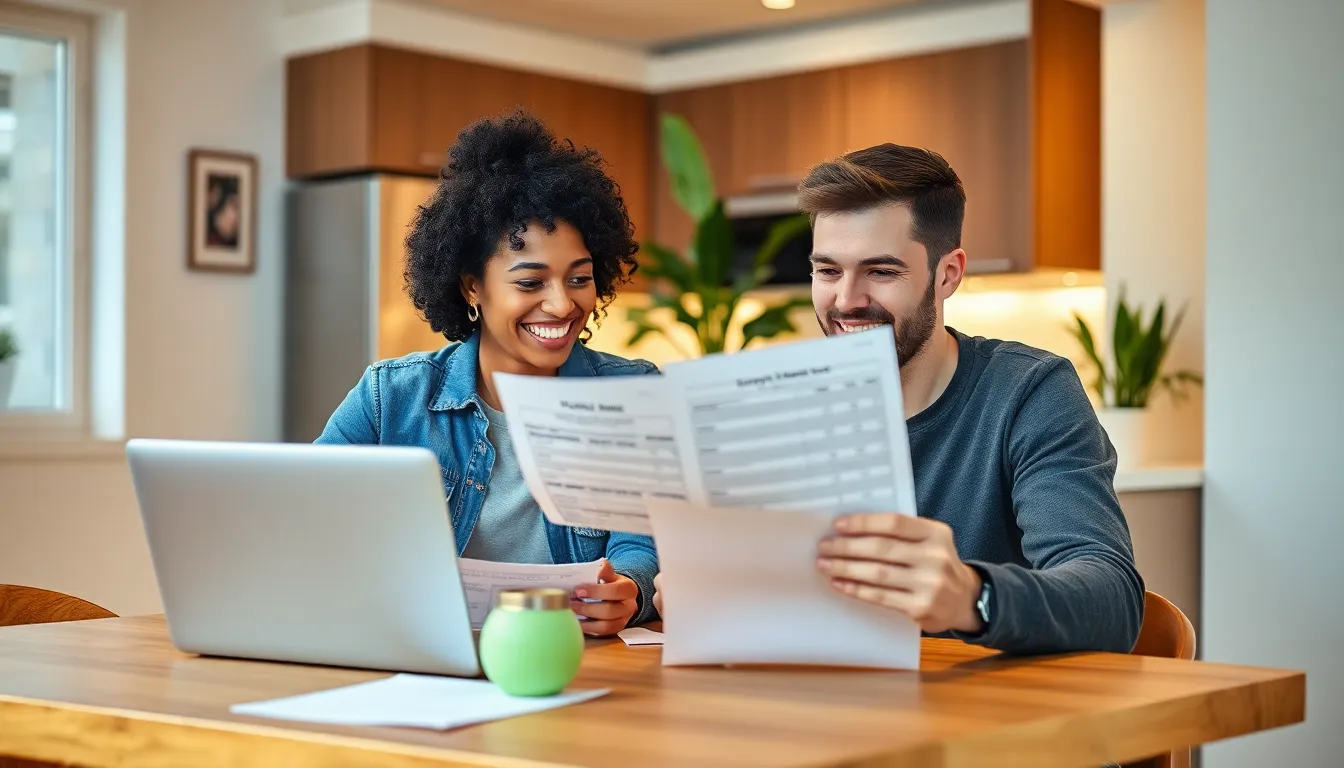Imagine stepping into your dream home without emptying your wallet. Sounds like a plot twist in a rom-com, right? But buying a house with no money down isn’t just a fairy tale; it’s a reality for many savvy homebuyers. With the right strategies and a sprinkle of determination, anyone can unlock the door to homeownership without breaking the bank.
Table of Contents
ToggleUnderstanding No Money Down Home Purchases
Purchasing a home with no money down represents a viable option for homebuyers. It means acquiring a house without an upfront cash payment for the down payment.
What Does No Money Down Mean?
No money down refers to financing options that allow homebuyers to obtain a mortgage without a traditional down payment. Programs like Veterans Affairs loans and USDA loans provide this benefit. Homebuyers access 100% financing through these loans. Lenders mitigate risks by ensuring that buyers meet specific criteria, such as income levels and property locations.
Common Misconceptions
Many believe that no money down options come with unfavorable terms. This isn’t accurate since competitive interest rates often accompany these loans. Another common misconception involves assuming credit scores must be perfect. In reality, some programs permit lower scores, making homeownership accessible. Buyers sometimes think they lack options for homes due to no down payment, yet various properties qualify under specific programs.
Types of No Money Down Loans

Different loan types offer viable paths to buy a house with no money down. Each option provides unique benefits catering to various buyer needs.
VA Loans
VA loans are designed for veterans and active-duty service members. This loan type offers 100% financing for qualified borrowers, eliminating the down payment requirement altogether. Competitive interest rates accompany these loans, often leading to lower monthly payments. Additional perks include no private mortgage insurance, which helps lower the overall costs associated with homeownership. Eligibility demands service in the military and a valid Certificate of Eligibility. Many service members find this option an ideal route to homeownership.
USDA Loans
USDA loans support rural and suburban homebuyers. These loans also finance 100% of a property’s purchase price, making them an attractive choice. Income eligibility requirements apply, ensuring households do not exceed 115% of the median income for the area. Properties must meet specific location criteria as defined by the USDA, which often includes areas outside urban centers. By promoting growth in rural communities, these loans empower buyers to obtain homes without upfront money.
FHA Loans
FHA loans accept lower down payments, sometimes as low as 3.5%. Even though this amount isn’t zero, it remains a manageable option for many buyers. Borrowers can utilize a gift from family or friends to cover the down payment. These loans cater to individuals with less-than-perfect credit, providing access to many potential homeowners. The Federal Housing Administration insures FHA loans, encouraging lenders to make these loans accessible. Such loans serve as an excellent avenue for those aiming for homeownership with limited cash resources.
Pros of Buying a House With No Money Down
Acquiring a home without a down payment presents several advantages. One of the primary benefits includes increased accessibility.
Increased Accessibility
Purchasing a house with no money down makes homeownership possible for individuals facing financial constraints. Such options allow buyers who may lack substantial savings to enter the housing market. Veterans and rural residents particularly benefit from programs like VA and USDA loans, respectively. With 100% financing available, more families can secure stable housing. Flexible eligibility requirements for lower credit scores further enhance accessibility. These factors considerably widen the pool of potential homeowners, supporting various income levels and backgrounds.
Potential for Higher Returns
Investing in property without upfront cash can lead to significant returns in the long run. Home values typically appreciate over time, allowing buyers to gain equity without initial investments. Entering the market sooner rather than later often results in capitalizing on favorable market conditions. This strategy can generate wealth more quickly compared to delaying homeownership for savings. Additionally, property owners benefit from tax deductions on mortgage interest, amplifying overall financial gains. Homeownership ultimately provides a foundation for building long-lasting wealth.
Cons of Buying a House With No Money Down
Homeownership with no down payment might sound appealing, but it comes with significant drawbacks. Understanding these can help potential buyers make informed decisions.
Higher Monthly Payments
Affordability concerns often arise with no money down purchases. Buyers face larger monthly payments since they finance the entire home price. Higher loan amounts result in increased mortgage payments, which can strain budgets. Many lenders charge higher interest rates for such loans, leading to even larger costs over time. Struggling to meet these financial obligations can create stress for homeowners, especially if unforeseen expenses arise.
Risk of Negative Equity
Negative equity poses a major risk for buyers who opt for no money down loans. This situation occurs when a home’s value drops below the outstanding mortgage balance. Market fluctuations can lead to rapid decreases in property values, trapping homeowners in unfavorable financial positions. Selling a home under these circumstances may result in financial loss. Sticking to a mortgage without equity can also impede long-term investment opportunities, ultimately making homeownership less advantageous.
Tips for Buying a House With No Money Down
Purchasing a home with no money down is achievable with the right strategies. Several essential steps can help prospective buyers navigate the process successfully.
Finding the Right Lender
Selecting an appropriate lender is crucial when pursuing no money down options. Research lenders that specialize in VA, USDA, and FHA loans. Compare interest rates, loan terms, and fees to find the most favorable offerings. Communicating directly with lenders to clarify their requirements ensures understanding of eligibility. Some lenders may even provide guidance specific to no down payment financing, assisting borrowers in maximizing benefits. Building a relationship with a lender who understands unique financial situations can lead to better solutions.
Exploring Assistance Programs
Various assistance programs exist specifically to support homebuyers with no down payment. Many states offer down payment assistance through grants and forgivable loans. Local housing authorities sometimes provide valuable resources to help buyers in specific regions. Additionally, organizations like the National Homebuyers Fund offer programs specifically designed to assist those with limited finances. These initiatives make homeownership feasible by alleviating some of the upfront costs associated with buying. Investigating available assistance options can significantly impact overall affordability.
Buying a house with no money down opens doors for many aspiring homeowners. With the right knowledge and resources, individuals can navigate the complexities of no down payment options effectively. Whether through VA, USDA, or FHA loans, these programs provide opportunities that make homeownership attainable.
It’s essential for buyers to weigh the pros and cons carefully. While the allure of no upfront costs is strong, understanding the potential financial implications is crucial. By doing thorough research and seeking guidance from knowledgeable lenders, buyers can make informed decisions that align with their financial goals. Embracing the journey to homeownership without a down payment can lead to rewarding outcomes and lasting stability.



